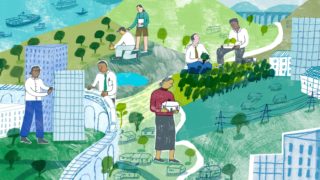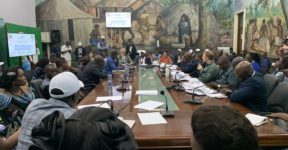
From theory to practice: How to disrupt North-South research partnerships
Establishing an equitable decision-making process within a North-South research partnership is fundamental for it to be successful. This was a key part of the Forest Governance, Market and Climate project by CEBRAP in Brazil, CEPAS in the Democratic Republic of Congo, CTSS-IPB University in Indonesia and Chatham House in the UK. In the beginning of the project, all research partners discussed how much each were willing to take on with regard to decision-making, all sharing a willingness to change a system that has been in place for decades.
As explained in a blog by Chiara Chiavaroli, research partnerships often follow a neo-colonial pattern, where projects are developed and supervised by researchers in the Global North whereas researchers in the Global South are often relegated to providing data collection in the field.
‘It is important to challenge such assumptions that still shape our relationships with researchers based in other countries at both the institutional and individual level. Critical reflections on our positionalities are essential to building equitable relationships,’ she says.
The Forest Governance, Market and Climate project has sought to tackle two distinct, though interlinked, dimensions:
- The quality of the research partnerships between institutes in the Global North and Global South.
- The transnational initiatives affecting tropical forest governance, land and people.
Each partner was free to decide the topic they thought most relevant to their location and how to undertake the research.
However, one of the key challenges to building equitable partnerships with collaborators from different countries is language. There is a tendency of English being the dominating language. Yet, this inclination leads to a lack of voices from non-European countries, creating additional pressure on researchers who feel they have to publish and present in English. The project addressed this by making one of the deliverables a policy brief published in the countries’ language with no need for an English translation.
When asked about the importance of producing a policy brief for the project in the local language, Louise Nakagawa, partner of the project from CEBRAP, says: ‘Communication is key to forest development and governance. For us, it is an opportunity to understand how international cooperation can support the projects that have been developed in Brazil.’
Fitta Setiajiati, from CTSS-IPB, emphasizes the fact that ‘the policy brief was deliberately written in Indonesian to reach the most local actors and be used as a reference especially when addressing international trade issues without reducing local rights’.
She also points out that the collaboration ‘provided opportunities for stakeholders from local, national and international level to contribute to ideas regarding the effectiveness of the SVLK in Indonesia’.
Below you can find a summary of each policy brief in Portuguese, French, Indonesian and English.
- CEBRAP’s policy brief: Governança florestal e transição sustentável na Amazônia: desafios e oportunidades (Forest governance and sustainable transition in the Amazon: challenges and opportunities) focuses on how forest governance in the Amazon can be strengthened through the lenses of the FSC and the Amazon Fund. One of the main opportunities highlighted is the need to face power asymmetries which tend to limit the participation of local groups in decision-making. The policy brief demonstrates the need for a diversified productive structure which values sustainable practices as well as impacts on the expansion of mechanisms of forest governance.
- CEPAS’s policy brief: Sur la question de la levée du moratoire et recommandations au gouvernement (On the issue of lifting the moratorium and recommendations to the government) aims its attention at the potential lifting of the moratorium without resolving downstream issues such as corruption, transparency, forest law violations and more. The policy brief emphasizes that it would risk opening up a path to uncontrolled deforestation with consequences that could harm the forest and the people who depend on it. One of the main recommendations is for the government to consolidate the opportunities of the forest sector namely through the finalization of defining forest policy.
- CTSS-IPB’s policy brief: Efektivitas Penerapan SVLK pada Berbagai Tipe Alas Hak (The effectiveness of SVLK implementation on various types of rights) highlights the various types of forest rights which provide different perspectives on the effectiveness of the legality and sustainability verification system SVLK. One of its main recommendations is that the government should encourage policies that can increase business profitability, both in state forests and community forests, as incentives for sustainable forest management, job creation and business opportunities as well as to increase people's income in accordance with the Job Creation Law (Undang undang Cipta Kerja).
Izabella Teixeira, current co-chair of the International Resource Panel and former environment minister of Brazil, highlights the need to be aware of the different realities of countries before being able to align with the international community. She says, ‘there is a need to learn how to come together in South-South cooperation,’ in order for countries to understand each other and be able to work together.
Similarly, René Ngongo, founder of the environmental NGO, Organisation Concertée des Écologistes et Amis de la Nature (OCEAN) in the DRC, points out: ‘If you make something for me, without me, it can be considered as something against me’. In this vein, it is important to exchange experiences between countries, especially between South-South countries, in order to implement best practices for all stakeholders.
Policy briefs such as those produced by this project are crucial for countries to inform their societies about current issues happening and actions that governments are recommended to take. Indeed, they can help open up dialogue at the national level and then at international level for more adequate opportunities of South-South cooperation.
It is challenging to establish an equitable balance in research partnerships, especially when the Global North and South are involved, yet feedback from this project shows that it is achievable as long as top-down decision-making models are disrupted by increasing diversity and inclusion. This, in time, can help develop not only more equitable North-South partnerships, but also South-South ones too.


